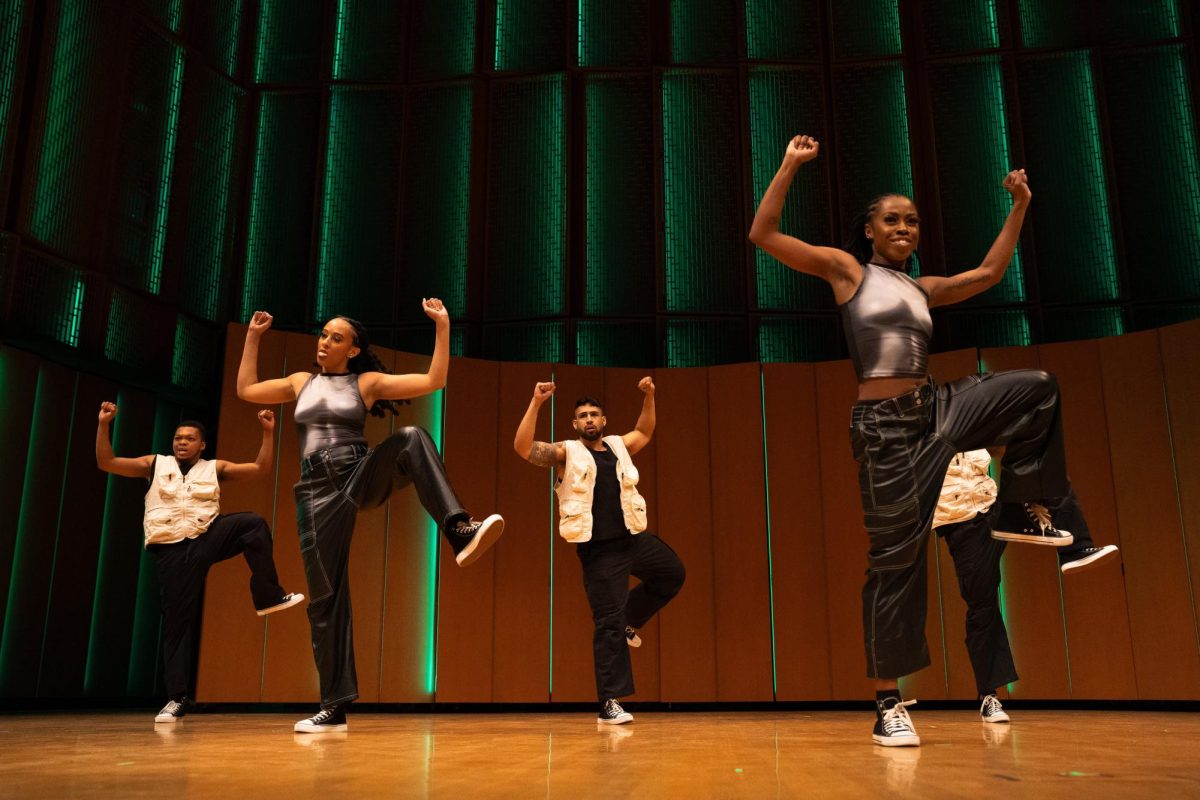On Jan. 30, Carleton’s Student Activities Office (SAO) hosted the dance troupe Step Afrika! in Kracum Performance Hall. Step Afrika! is a Washington, D.C.-based dance troupe that blends traditional and contemporary dance styles into a unique step performance. The event was free and open to all students, faculty and Northfield community members. To incentivize attendance, students were able to sign in for a specific club, with the three clubs with the highest attendance winning $500 each from SAO.
Step Afrika! touts themselves as being in the top 10 African American dance troupes in the United States and describes their performances as a blend between traditional African dances, historically African American dance styles and contemporary dance. They use the art of stepping as an educational tool to foster teamwork, academic achievement, and cross-cultural understanding.
Step Afrika! also performs an annual 50-city tour of colleges, universities and theaters for Black History Month. In the 2022-2023 fiscal year, they performed in 20 educational venues — none in Minnesota — during their Black History Month tour with a total of 9,830 attendees. They aimed to perform in 30 in the 2023-2024 fiscal year. Step Afrika! also performed at the White House’s 2023 Juneteenth concert, and their work is currently featured in the Smithsonian National Museum of African American History and Culture in Washington, D.C.
The group has visited Carleton’s campus once prior, in 2018, and hosted a successful and well-attended event, said SAO Associate Director for Student Activities Nathan Riel-Elness. Many SAO events, especially those featuring an outside group, run on an every-other-year schedule, but the group was unable to return to campus in 2020 due to the COVID-19 pandemic, and the event did not resume in the subsequent years.
Step Afrika!’s return to campus is largely due to the efforts of the Student Activities Programming Board (SAPB). The SAPB is staffed by students as a part of Carleton’s Peer Leader Program, which offers leadership development programming to around 200 current students employed across 12 college offices. SAPB employee Natalie Berman-Schneider explained, “Each peer leader office at Carleton is moving forward with different DEI initiatives this year, and SAO really wanted to focus on putting on events that focus on diversity, equity and inclusion.” One aspect of this involved looking at events that had previously been hosted on campus and seeing if their resumption would be plausible.
Riel-Elness said this year’s Step Afrika! program was a partnership between the Carleton Student Association (CSA) and SAO and combined the office’s IDE goals with the start of Black History Month, which began Feb. 1. The combined effort allowed funding for the event to be split, with half coming from CSA’s annual allocation to the SAPB and the other half coming from SAO’s general funds, allocated by the college.
Berman-Schneider, who is also a member of CSA’s Budget Committee, notes that SAPB allocations are tied to specific events such as Sproncert, Mid-Winter Ball — and this year — Step Afrika!. Riel-Elness said that the total contract cost was around $10,000 with some variability due to fluctuating travel costs for the performers. SAO contributed an additional $1,500 of office money to host the club attendance competition.
Addressing the club prize money, Riel Elness focuses on the office’s efforts to support SAPB. “We wanted to make sure it was successful for them, so our team wanted to put up this competition because it gets the word out, it gets students talking about it,” Elness said. “Because we haven’t had this event on campus for a long time, none of our current students have seen it so that sort of word of mouth advertising doesn’t exist right now.”
Although SAO has not held this sort of attendance competition in the past, both Riel-Elness and Berman-Schneider found it effective and think it is something that the office would consider hosting again in the future for Step Afrika! and for other events., They successfully met their goal of filling Kracum, a 400-seat venue designed for concerts, dance and presentations.
Riel-Elness felt the event went well, and is hopeful that SAO will be able to bring Step Afrika! back to campus in the future. He also noted that while Carleton hosted a smaller-scale version of Step Afrika!’s performance, SAO would also be interested in hosting a larger rendition if budget and logistics allow.










